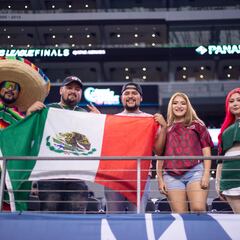What was the homophobic chant that caused USMNT - Mexico to be delayed?
The United States ran out winners in the final of the CONCACAF Nations League on Sunday evening, in a game marred by discriminatory language.


The United States maintain their dominant record in CONCACAF Nations League, winning the continental title for a third successive time in a contentious final against Mexico.
USMNT won the game 2-0 thanks to two clinical strikes from Tyler Adams and Gio Reyna. Adams’ goal in particular will live long in the memory, a 35-yard screamer to open the scoring for Gregg Berhalter’s side.
However the game was marred by homophobic chanting from an element of the Mexico support, a feature that has remained depressingly common despite countless attempts to address the issue. Referee Drew Fischer was forced to halt the game in the 88th minute and again during added time due to the chants and at least one supporter was removed from the stadium as a result.
TYLER ADAMS WITH A BANGER 🤯 🇺🇸 pic.twitter.com/Uv8oqAJwss
— Concacaf Nations League (@CNationsLeague) March 25, 2024
What is the homophobic chant used by some Mexican fans?
Mexican fan culture is one of the most passionate and most ferocious in world soccer, a point of pride for supporters who follow El Tri. However one unsavoury element of the national team’s support is a homophobic chant that has persisted in recent years.
When an opposition goalkeeper is preparing to take a goal kick some supporters use a chant that include the slur ‘puto’ in a bid to distract the player. The word can be translated to a slang term for a male prostitute and gay rights groups have repeatedly highlighted the homophobic nature of the chant.
Related stories

Fan fight in Mexico vs United States goes viral

“We can find different ways to win games” -Tim Ream
Unfortunately the chant is nothing new and Mexican soccer’s governing body, FMF, has engaged on a long-term awareness campaign in a bid to rid the nation’s fan culture of the practice. Members of the national team have been used in videos encouraging fans not to use the chant. The Mexican federation has previously been punished for its supporters’ use of the slur, including during World Cup qualifiers and at the 2018 tournament in Russia.
Today the chant has become a symbol of discontent, weaponised by a small section of supporters to voice their displeasure at the on-field performances and at the federation’s work. That was the case again on Sunday evening with the chant only being deployed once the USMNT had reached an unassailable position in the game. However that does not distract from the discriminatory nature of the chants themselves or the fact that Mexican soccer was, in every sense on Sunday evening, the loser.
Complete your personal details to comment